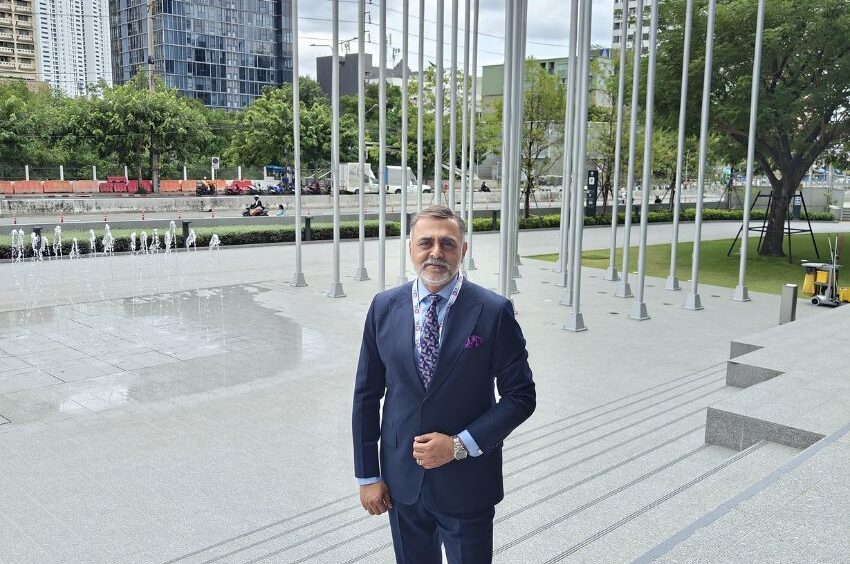Amreesh Chandra: An SDG Agent

It was March 2022 when I saw Amreesh Chandra for the first time in action talking about Sustainability, at the University of Southampton, United Kingdom. Little did I realise then that he is the same person whom I had encountered in my childhood when both of us were under the age of ten
Byline: Sudhir Mishra & Mihir Shrivastava
It took various encounters with Chandra to truly understand his vision, ambit, scale and plans of sustainability for children and the amplification of the entire sustainability narrative which he wanted to build from a grassroot rural perspective. Until now all the climate change debate and sustainability approaches have focussed on a top to bottom approach. But, here we have a trailblazer who has taken upon himself the task to apply the bottom to top approach in sustainability and bring rural India to the forefront of the sustainability debate. In his quest to bring sustainability to the grassroot level, he has already taken exemplary steps and shifted containers to Gorakhpur and the neighbouring districts and started schools in containers so as to ensure that more students can be accommodated and receive education at the rural level. This has not only been appreciated by the national community but has been highly applauded by the international SDG Managers who realized that something groundbreaking is taking place at the grassroot level.
Amreesh Chandra is a disruptor for the better. An educationist par excellence, he has been part of many initiatives, and one of the most significant of them is creating awareness amongst children and youth about the United Nations Sustainable Development Goals or the SDGs—there are 17 of them, mostly overlapping, yet define a way of life, for a growth and development that’s equitable, devoid of discrimination on the basis of identity—be it caste, creed or gender; and done in a way that’s sustainable for the future generations.
He has worked alongside world leaders with the view that ‘education has the strength to deliver an even greater impact,’ particularly when it comes to Education for Sustainable Development (ESD) under the framework of the United Nations. In 2010, he attended SDGs global conclave in New York that gave him an opportunity to ascertain what global agencies and policymakers are doing in this regard worldwide. He shared his thoughts as well, ‘if one acquires the awareness, there is adequate knowledge, tools and guidance on actions at school level can inspire and configure sustainable impact toward our planet and its prosperity.’
He has set an example as the Executive Principal of St. Paul’s School (SPS), Gorakhpur— founded by his parents in the late 1970s. He designed a curriculum that empowers students on the SGD goals by inculcating it in every aspect of their life. Every nook and corner, pillars and walls are a reminder of the 17 SDGs, with the idea, in the words of Amreesh, ‘to create a mindset beyond an academic standpoint to adopt sustainability as a culture rather than a one-time learning input.’ Taking the cue from SPS, the Gorakhpur University has also taken similar measures to create awareness.
Thanks to the staff and support of the SPS, Amreesh has been organising events of the global scale in Gorakhpur–an innocuous city of eastern Uttar Pradesh, contrary to the expectations that such events usually take place in Amsterdam, London, or New York, and if in the country, perhaps in Delhi or Mumbai. In the times to come, Gorakhpur will provide a template for ESD; children are not just the instrument of change but the change in themselves.
Amreesh is the founder of The Canvas, the initiative to create awareness and mobilise the student globally to take action on the SDGs – by educating, and empowering them across high-schools and universities. In pursuance of this larger objective, SPS has created a new template for education, where the employees, high or low, all have their children studying in the school, as equals–some of them hold senior positions in the corporate or the government and are very committed to the cause of the environment, almost with religious fervour.
An effective communicator, a motivator and a doer, Amreesh, is a natural leader with a high emotional quotient. He’s blessed with a remarkable capability to align people from varied walks of life and various stakeholders to the cause of SDGs—be it lawyers, film stars, corporate leaders, environmentalists, politicians, bureaucrats, planners, journalists and activists to strategize, and ensure synergy to spread the SDGs way of existence. He founded Chandra EduLinks (CEL) to enable individuals and corporations to strategise, incorporate and implement, as part of their business doctrine, a sustainable growth model that involves participation of stakeholders and support of the community
For being an undaunting champion of SDGs, from kindergartens to the development of Higher Education cities, not only in India but the UK, but across the globe, he was bestowed with the title of ‘Freeman to the City of London’—the first Indian to get this honour.
Amreesh is driven by faith to make this planet a better place to live in. Apostle Ankit Sajwan—founder of the FOLJ Church—is his friend, philosopher and guide. He is taking forward the work of his parents–Rev. Girish Chandra and Nirmala Marian Chandra—who painstakingly built SPS, and have for nearly 50 years worked selflessly for the cause of education. Their life is their message of simplicity and grace.
His life-partner is very talented Preeti, they are parents of two high achiever daughters— Sarah Muskan and Khushi Ann. Sarah pursued studies in the US, is a doctor married to a doctor while Khushi is to take forward the legacy—service to humanity. They continue to remain disarmingly simple, are courteous and driven. He’s a proud son and a proud father.
Amreesh could have had a lucrative career with high remuneration, but that was not to be; has a larger goal in life beyond his personal ambition. He’s hopeful for a better future. ‘I see global leaders affirm that education may just do that – bridge the gap between knowledge and implementation of the SDGs multilaterally, from nations to sub-regions and cities, across people and partnerships.’ he elaborates. Thanks to his efforts, Gorakhpur is on the global map of SDG, as a sustainable model for change and that too at an unprecedented pace.
He is an ambitious leader, bold enough to think of making Gorakhpur the ‘Davos of Sustainability.’ He has the will and the vision to put Gorakhpur on the international map and make it ‘Sustainable Developing Gorakhpur’. The ability to do such groundbreaking work for the implementation of SDG goals at the grassroot rural level is a clear example of sheer determination, dedication and focus towards the goal for which he is relentlessly working. His consistent efforts and passion for sustainability and the results which he has achieved in changing the rural narrative can be summed up in the words of the famous Hindi writer, Dushyant Kumar,
“Kaun kehta hai Asman mein Surakh Nahi ho sakta, ek pathar toh tabiyat se Uchalo yaaro”
















































































































































































































































































































































































































































































































































































































































































































































































































































































































































































































































































































































































